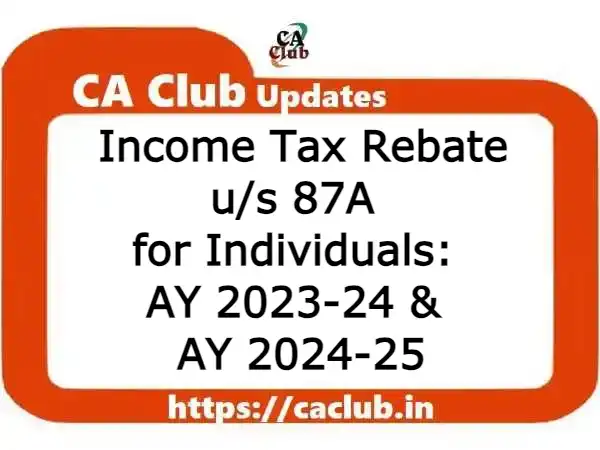Resident individuals under existing tax regime having a total income of up to Rs 500,000 can receive a tax rebate of up to Rs 12,500 under Section 87A for AY 2023-24 and onwards. Whereas those who opts for the new tax regime under Section 115BAC and having total income up to Rs 700,000 can claim a higher tax rebate of up to Rs 25,000 u/s 87A from AY 2024-25 and onwards.
Tax Rebate u/s 87A for AY 2023-24 and Onwards (Existing Regime)
Section 87A of the Income Tax Act, 1961, provides for a 100% tax rebate if the income tax liability is up to Rs 12,500 in respect of AY 2023-24 and onwards for resident individuals with taxable income up to Rs 500,000 under the existing tax regime. It should be noted that no marginal relief shall be available if total income exceeds Rs 500,000, unlike in the case of tax rebate under new tax regime from AY 2024-25.
The tax rebate u/s 87A has been increased vide Section 8 of the Finance Act, 2019, from Rs 2,500 to 12,500, applicable from AY 2020-21 and onwards. Earlier, Section 87A was introduced by the Finance Act 2017 and tax relief of up to Rs 2,500 was available to resident individuals having taxable income up to Rs 3.5 lacs.
Accordingly, a resident individual having total income up to Rs 5,00,000 can claim a full tax rebate of up to Rs 12,500 u/s 87A in the form of a deduction from their tax liability. In other words, the rebate u/s 87A shall be 100% of income-tax liability or Rs 12,500, whichever is lower, for resident individuals having total income up to Rs 5,00,000. But this rebate won’t be given if the taxable income is more than Rs 500,000.
As a result of the enhanced tax rebate, individuals under existing tax regime who make investments of up to Rs 150,000 and are eligible for deduction u/s 80C will have a tax-free income of up to Rs 650,000, which may be further increased with other available deductions and exemptions, like interest on home loans up to Rs 200,000, interest on education loans, NPS contributions, medical insurance premiums, medical expenses for senior citizens and so on.
Tax Rebate u/s 87A for AY 2024-25 and Onwards (New Regime)
Section 44 of the Finance Act, 2023 has introduced higher tax rebate of up to Rs 25,000 for resident individuals having total income of up to Rs 700,000 and opting for new tax regime under section 115BAC of the Income Tax Act, 1961, in respect of AY 2024-25 and onwards. Also such taxpayers are allowed marginal relief for income slightly higher than Rs 700,000 to avoid denial of this tax rebate.
Marginal Relief for Tax Rebate u/s 87A
If the marginal difference in tax liability (i.e. tax on actual income minus tax on Rs 700,000 income) is greater than the marginal difference in income (i.e. actual total income minus Rs 700,000 income), then the marginal rebate u/s 87A to the extent of such excess is available for AY 2024-25 to ensure availability of tax rebate of up to Rs 25,000. This calculation procedure is simlar to calcuation of marginal relief from surcharge.
Taxes Not Subject to Rebate u/s 87A
The rebate provided under Section 87A cannot be claimed against certain taxes, like tax on the accumulated balance of recognized provident fund under Section 111 and tax on long-term capital gains resulting from the transfer of certain securities under Section 112A of the Income Tax Act, 1961.
Incomes not qualifying for tax rebate under section 87A include long-term capital gains (LTCG) from equity shares, equity mutual funds and certain specified incomes.
If an individual has LTCG from selling equity shares or equity mutual funds, they will not be eligible for the tax rebate under section 87A. LTCG from these sources is taxable at a special rate of 10% if it exceeds Rs 1 lakh in a financial year; LTCG up to Rs 1 lakh is exempt from tax.
To illustrate, if an individual’s taxable income qualifies for the tax rebate under section 87A, but they also have LTCG from equity shares or equity mutual funds, they will need to pay a special rate of 10% tax on the LTCG amount without considering the rebate. For example, if an individual has a net taxable salary of Rs 3.3 lakh a year and LTCG of Rs 1.30 lakh, they would pay 10% tax on the LTCG amounting to Rs 30,000 plus cess @ 4%, totaling to INR 3,120. The tax payable on the net taxable salary would still be eligible for the rebate under section 87A, reducing their tax liability.
Additionally, there are certain special incomes such as winnings from gambling, virtual digital assets (VDA), online gaming, lotteries, game shows or betting that do not qualify for the tax rebate under section 87A. These incomes are taxed at a flat rate of 30%, along with cess and surcharge if applicable.
Related Posts: >> Finance Act, 2022 >> Finance Act, 2023 >>

When total income is above Rs 7 lakh, how the rebate u/s 87A is calculated?
Please refer the para ‘Marginal Relief for Tax Rebate u/s 87A’.